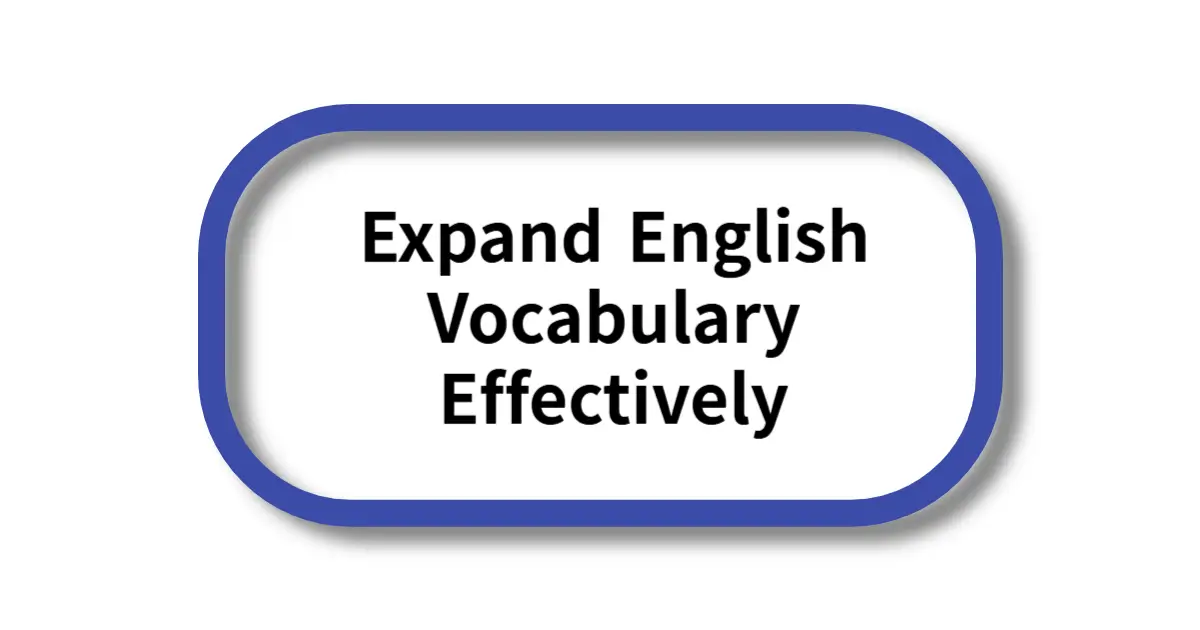Building a strong vocabulary is one of the most essential parts of mastering English. The more words you know, the more confidently you can express your thoughts, understand conversations, and comprehend texts. However, many learners often struggle with memorizing new words and using them naturally. In this post, we’ll explore effective strategies to expand your English vocabulary in a way that is practical, long-lasting, and enjoyable.
1. Expand English Vocabulary: Read Widely and Regularly
Reading is one of the most effective ways to grow your vocabulary. When you expose yourself to various texts—such as novels, news articles, or academic essays—you naturally encounter words in context.
- Start with content you enjoy (stories, blogs, magazines).
- Highlight unfamiliar words and try to guess the meaning from context before checking a dictionary.
- Keep a personal “word journal” where you write down new expressions with example sentences.
This method ensures you’re not just memorizing words, but understanding how they are used in real-life communication.
2. Use Flashcards with Spaced Repetition
Traditional vocabulary lists can feel overwhelming, but spaced repetition systems (SRS) make memorization more effective. Tools like Anki, Quizlet, or Memrise help you review words at scientifically calculated intervals, ensuring they move from short-term to long-term memory.
Pro tip: Don’t just memorize isolated words. Write short phrases or collocations on your flashcards (e.g., instead of only “commit,” use “commit a crime” or “commit to learning”). This helps you recall vocabulary in natural contexts.
Best Free Apps to Learn English in 2025 (That Actually Work)
3. Learn Through Context, Not Translation
A common mistake among learners is relying too heavily on translation. Instead, focus on learning words in context. For example:
- Instead of translating “curious” into your native language, connect it with real examples: “a curious child,” “I’m curious about science.”
- Associating words with images, emotions, or stories makes them more memorable than direct translation.
This way, vocabulary becomes part of your thought process in English, reducing the need for constant mental translation.
4. Engage in Active Usage
Passively recognizing a word is not enough; you must actively use it to retain it. Try these activities:
- Write short stories or journal entries using your new vocabulary.
- Practice speaking with a language partner or tutor, intentionally including new words.
- Join online communities (like Reddit language forums or English Discord servers) to use vocabulary in real conversations.
Remember: “Use it or lose it.” Words become permanent when you apply them regularly.
5. Group Words by Theme or Concept
Instead of learning random vocabulary, organize them by topics (e.g., travel, emotions, technology). This creates mental connections that make words easier to recall.
For example, under “travel,” you might learn:
- itinerary
- reservation
- boarding pass
- sightseeing
By grouping related words, you’re building a semantic network in your brain, which improves retention and recall speed.
How to Learn English Fast in 2025: 10 Proven Tips
6. Leverage Media: Movies, Podcasts, and Songs
Immersion through media makes vocabulary learning fun and natural.
- Watch movies or series with English subtitles to connect spoken and written words.
- Listen to podcasts for authentic usage and idiomatic expressions.
- Try learning song lyrics and sing along—this improves both vocabulary and pronunciation.
The key is active engagement: pause, write down new expressions, and repeat them until they stick.
7. Review and Reflect Consistently
Vocabulary learning is not a one-time activity; it’s an ongoing process. Dedicate 10–15 minutes daily to reviewing old words while adding new ones. Consistency is more powerful than cramming.
Keep track of your progress:
- Review your word journal weekly.
- Test yourself by writing essays or explaining topics using new vocabulary.
- Celebrate small wins—every new word mastered brings you closer to fluency.
Additional Vocabulary Learning Resources
Following tools can accelerate your vocabulary learning journey.
Vocabulary.com
🔹 A comprehensive platform that explains word meanings, provides real-life examples, and even offers quizzes. It makes vocabulary learning engaging and game-like.
Quizlet – Vocabulary Flashcards
🔹 A flashcard-based study tool where you can find or create vocabulary sets. Its spaced repetition system helps learners retain words effectively.
Oxford Learner’s Dictionaries
🔹 A trusted dictionary that provides British and American pronunciations, example sentences, and vocabulary levels. Perfect for understanding subtle differences in word usage.
BBC Learning English – The English We Speak
🔹 Short audio episodes with scripts that teach idioms and expressions used in real-life conversations.
Anki
🔹 A powerful flashcard program based on spaced repetition. You can download shared vocabulary decks or create your own to master words over the long term.
Memrise
🔹 A user-friendly app that combines vocabulary learning with short videos from native speakers. Great for improving both word recognition and natural usage.
Expanding your English vocabulary doesn’t have to be boring. With resources like flashcards (Quizlet, Anki), native-speaker content (BBC Learning English, Memrise), and trusted dictionaries (Oxford, Vocabulary.com), you can build your word bank more effectively and enjoyably.
Final Thoughts
Expanding your English vocabulary doesn’t have to be overwhelming. By combining reading, contextual learning, active usage, and modern tools like SRS, you can steadily grow your word bank and become a more confident communicator. Remember, vocabulary is not just about memorizing words—it’s about building connections that allow you to think and express yourself naturally in English.
Start small, stay consistent, and watch your vocabulary grow over time. 🌱
Learn English on YouTube: Best Channel to Watch in 2025

